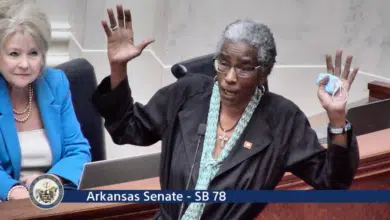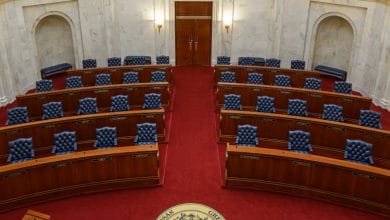ARKANSAS, (KFSM)— Many laws in Arkansas go into effect 90 days after the day the state legislature finishes the session, which this year was May 1, 2023.
Below is a list of new Arkansas laws that were passed during the legislative session, with many going into effect on or around July 31, 2023.
Act 11: A law requiring flags purchased with public funds to be made and manufactured in the United States.
Act 21: A law replacing the term “child pornography” with the term “child sexual abuse material” in the Arkansas Code.
“I want every child to feel that his or her life matters,” said Rep. Charlene Fite. “If a child has been videoed, in any kind of sexual portrayal – a crime has been committed against that child – and the visual portrayal is evidence of that crime.”
The term “pornography” implies there has been an exchange of consent. When children are involved, there is no consent to what is shared and viewed. The change in terminology aims to help solidify that in the eyes of the law.
Act 30: A bill that amends the laws concerning concealed carry permits and authorizes an individual who has “sought voluntary mental health treatment” to obtain a concealed carry permit after a certain time period.
Act 35: A law prohibiting a registered sex offender from purchasing, owning, possessing, using, or operating an unmanned aircraft (drone) for private use.
The law states that an “unmanned aircraft” means an aircraft commonly known as a drone that is operated without the possibility of direct human intervention and has the ability to photographically or electronically record.
Act 113: A law that will provide food and medical care to a canine retired from the division of Arkansas State Police in certain circumstances, and to create Rino’s Law.
Act 115: A law that establishes June 12 of each year as Woman’s Veterans Day.
Act 131: A bill that was originally filed to classify drag performances in the state as “adult-oriented,” restricting businesses from hosting them and minors from attending the shows. However, after two amendments were made, ACLU of Arkansas said the law no longer “explicitly” targets the LGBTQ community, which is often found at the forefront of drag performances.
An “adult-oriented performance” is now defined in the bill as a performance that “is intended to appeal to the prurient interest” and that features:
- A person who appears in a state of nudity or is seminude;
- The purposeful exposure, whether complete or partial, of:
- A specific anatomical area; or
- Prosthetic genitalia or breasts; or
- A specific sexual activity
Act 165: A law amending the circumstances that justify the use of physical force upon another person in Arkansas, now changing the language from “teacher” to “school employee”.
Act 168: A law establishing Samantha’s Law in Arkansas, which allows a juvenile’s preferences concerning foster care placements in the state.
Act 195: A law creating the Youth Hiring Act of 2023 which loosens current child labor laws in the state, allowing children under 16 years old to work in Arkansas without needing an employment certificate.
However, Act 687 increases the civil penalties and establishes criminal penalties for those who violate child labor laws.
Act 290: A law creating Mental Health Awareness Week in public schools across Arkansas.
Act 305: A law that eliminates write-in candidates in Arkansas elections.
Act 310: A law creating a monument to the unborn on state Capitol grounds. The monument will mark the number of abortions performed in Arkansas before Roe v. Wade was struck down.
It also requires the Capitol Arts and Grounds Commission to oversee the selection of the artist and the design of the monument with input from anti-abortion groups.
Act 316: A law requiring screening for depression for birth mothers at the time of birth and mandating that insurance policies cover those screenings.
Rep. Aaron Pilkington, who sponsored the law, told 5NEWS there’s a high number of postpartum depression in Arkansas as well as depression during pregnancy.
Act 317: A law prohibiting transgender people at public schools in Arkansas from using the restroom that matches their gender identity.
The law applies to multi-person restrooms and locker rooms at public schools and charter schools serving pre-kindergarten through 12th grade.
Act 372: A law changing how libraries in Arkansas can decide how content is classified and even creates punishments if someone were to be caught “furnishing a harmful item to a minor.”
A joint lawsuit has been filed by libraries and groups across the state against the censorship law.
Act 477: A law defining a “spaceport” as a facility used for the “takeoff, landing, retrieval, servicing, and monitoring of vehicles capable of entering space.”
The law directs the Arkansas Economic Development Commission to conduct a study that would assess the feasibility of building a spaceport.
Act 514: A law establishing the Creating a Respectful and Open World for Natural Hair (CROWN) Act. The bill specifically bans hair discrimination in public schools and two-year and four-year universities in Arkansas.
The CROWN Act was created for students’ protection to have the freedom to wear their hair however matches their identity.
“Her idea behind it was just so kids or students feel comfortable wearing their hair however they choose to that’s not offensive, but it’s a true expression of who they are,” said Jay Richardson, State Representative (D) of Fort Smith.
Act 542: A law requiring parental approval for Arkansas teachers to address transgender students by the pronouns and names they prefer. Supporters of the legislation portrayed it as an effort to protect teachers from losing their jobs if they don’t want to use a name or pronoun a student uses.
Opponents of the measure, however, said it puts even more of a burden on teachers. Democratic Sen. Linda Chesterfield, a retired teacher, said the restriction removes the “spontaneity” of teaching by making teachers worried about the consequences if they don’t use the name on a student’s birth certificate.
Act 558: A law that requires a statewide accounting of all untested sexual assault collection kits and unsubmitted anonymous kits.
Act 559: A law amending the Right to Know and See Act, which now requires an abortion provider in the state who knowingly performs or refers a patient for an abortion to show the patient images of their ultrasound, although abortion is virtually banned in the state.
Act 611: A law that prohibits public entities in the state from contracting with companies that boycott energy, fossil fuel, firearms, and ammunition industries.
Act 612: A law creating the Protection of Minors from the Distribution of Harmful Material Act. It requires Arkansas residents to use a “digitized identification card” proving they are over the age of 18 before viewing porn.
Act 616: An amendment to the Justice for Vulnerable Victims of Sexual Abuse Act that removes the age limitation for a victim to bring a civil action against someone. Before, the statute of limitation on the law was that the victim must bring the civil action before they reach the age of 55.
Act 619: A law amending the criminal offense of sexual indecency with a child, adding the situation of an adult entering a “public changing facility” with the purpose of “arousal” if the room is assigned to persons of the opposite sex and a minor is inside.
In the bill’s original wording, the intent was to make it a crime for an adult to go into a bathroom not corresponding with their assigned birth sex, *and* to enter knowing there would be a minor inside.
An amendment was made adding that the purpose of entering the bathroom was for sexual desire, which is the version that passed the legislature.
Act 621: An amendment that gives a student who accompanies their parent or legal guardian to vote an excused absence in school.
Act 655: A law authorizing an Arkansas state park to sell alcoholic beverages without obtaining a permit.
Act 689: A law creating the Social Media Safety Act, which requires age verification for the use of social media and requires social media companies to verify identification before allowing someone to make an account.
The Social Media Safety Act will go into effect in Arkansas on September 1, 2023.
Act 739: A law creating the criminal offense of knowingly exposing another person to fentanyl.
Act 757: Amending the law concerning concealed handguns, stating that a person’s status as a qualifying medical marijuana patient or designated caregiver should not determine whether or not they are eligible to be issued a concealed carry license.
Act 758: A law prohibiting contracts with the government of the People’s Republic of China.
Act 811: A law requires that opioid overdose rescue kits be located on each campus of each public high school and state-supported institution of higher education.
Act 816: An amendment to the law concerning the restrictions on a driver when overtaking and passing a vehicle on the left.
Act 880: A law preventing state-funded medical schools in Arkansas from spending state general revenue funds from tax dollars on the name, image, and likeness (NIL deals) of a student-athlete under the Arkansas Student-Athlete Publicity Rights Act.






